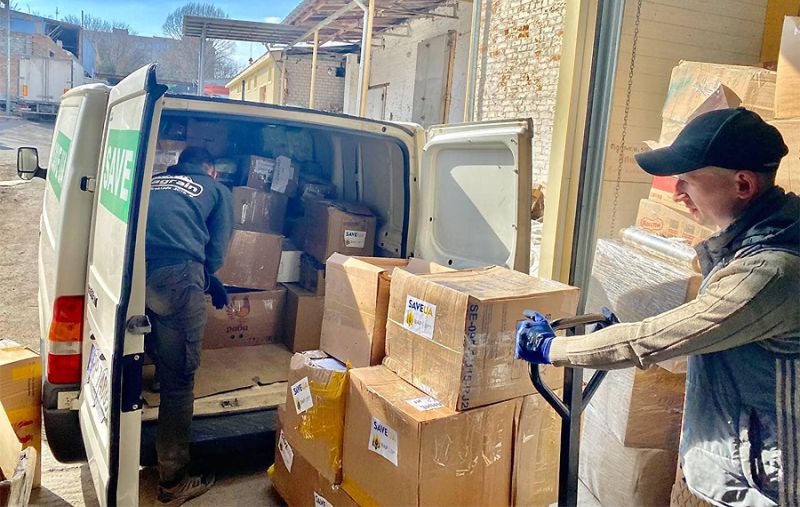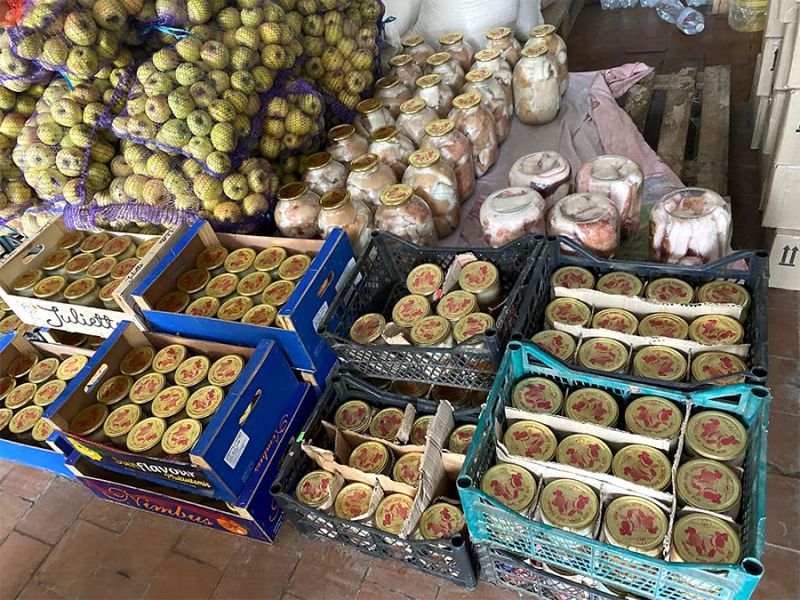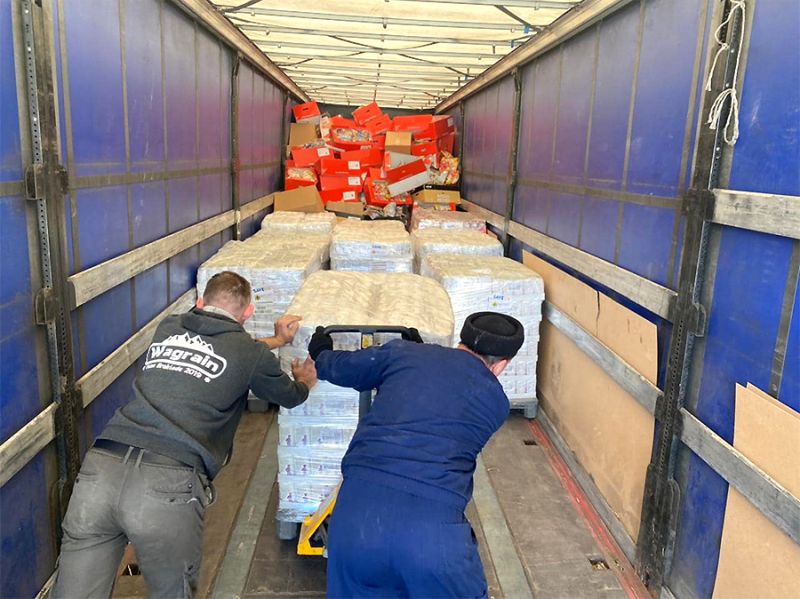food security,
sowing campaign,
agrarians
On two fronts. How agrarians together ensure sowing and food security in hotspots

Ukrainian agrarians, members of the Ukrainian Agri Council, have been helping the army, refugees and townspeople in the places of active fighting since the first days of the war. Now they carry out these activities in parallel with the sowing campaign.
Non-stop
They are reluctant to tell how they are helping others and are happier to share their plans for the sowing campaign carried out in extremely difficult conditions. It is necessary to feed the country both today and next season.
Scientific and production agricultural firm Perlyna Podillia is located in Khmelnytskyi region. There is more work to be done with the onset of the sowing season. Workers are in the fields during the day, and in the evening they are engaged in other matters, in particular, helping to win.
Sergii Ivashchuk, general director of the farm, says:

Photo. Since the beginning of hostilities, Perlyna Podillia is actively involved in providing food for military formations and humanitarian aid headquarters as well as providing feasible assistance to the army.
At the same time, the farm is sowing crops. It has already sowed 300 hectares of alfalfa for feeding livestock, planted 15 hectares of potatoes and sowed 180 hectares of sugar beets. They are planning to sow corn, sunflower and potatoes when it gets warmer. Like everyone else, they have problems with agrochemicals and have to readjust fast.
The farm has a herd of cows, and there are problems as well. «We have cows and we need to feed them. There was a problem with hay, veterinary drugs, which is worse, because many of them came from Kharkiv; we have also problems with micronutrients for cows. It is not so easy to find soy meal. As a result, we had to change the ration a little: we have reduced the amount of protein and added silage. We sell milk to Ternopil' Molokiia dairy factory,» Sergii Ivashchuk says.
We will sow less corn — costly because of fuel
The farm Kischentsi LLC in Cherkassy region has sent vegetables, milk and meat as humanitarian aid since the first days of the war. The owner of the farm Kees Huizinga, says: «We have given three cars to the army, transferred money for the territorial defense force, and provided local defenders with diesel fuel.»
The farmer, who originally comes from the Netherland, has recently spoke at the European Parliament, where he was convincing the EU that the only way to save global food security was to stop the Russian-Ukrainian war. Kees is returning to Ukraine to manage the planting season, and here he is more concerned about fuel problems.
«We are already seeing problems with the lack of fuel on our farm. We will have enough diesel fuel for the beginning of the sowing season, but by June 1 there will be none. For fuel economy reasons, we are not going to sow sugar beets, because of expensive transportation costs and expensive fuel. We do not have enough fertilizers until the end of the sowing season. We will buy them wherever we can. We hope for the support from the Ukrainian Agri Council (UAC), which cares about farmers and provides them with fertilizers, fuel and PPPs in these hard times. We are planning to plant simple crops: spring wheat, barley, soybeans and corn. We are going to sow less corn, compared to the last year. Corn needs to be dried, and it requires the use of gas, which may be a problem in the future. There is no problem with milk production. Our milk goes to Ternopil' Molokiia dairy factory, payments are made according to the contract. I will say that Ukraine will be able to provide itself with products. The biggest problem will be to deliver them to Ukrainians,» Kees says.
We are feeding checkpoints, sowing peas and fertilizing winter crops
TAVRIA private agrarian enterprise cultivates 5 thousand hectares in the south of the Dnipropetrovsk region. General Director Volodymyr Yevtushenko says: «Since the first day we have fed the checkpoints in our region and transfer funds to help army. We should help all together to win. Our farm is on the border with the Kherson region, and the village of Novovorontsovka, which is constantly bombed, is 15 km away. So there are many checkpoints and we help as much as we can.»
Workers are already working at full strength in the fields. They regret that night shifts are impossible during the curfew. The ground stayed frozen for a long time, and now we have «to catch' moisture, which levels are much less than last year. Therefore, late crops such as sunflowers or maize will be at risk. The farm is worried about financial issues and here it is very much expected that concessional loans will become a reality, not promises.
«We have already sown peas on 500 hectares, but the issue of finances is very acute. We have finished products that we cannot sell because we are blocked. Cabinet of Ministers has made the right decision to help banks in the form of soft loans — unfortunately, it is still at the level of discussions. We were able to fertilize winter crops, because we had last year’s fertilizer stocks, but we still need money for further sowing of sunflower and corn, these crops need fertilizers and PPPs. We need money for sowing today and there is no time to wait for the CMU decisions to work in real time,» Volodymyr Yevtushenko says.
Fuel is needed for both sowing and war
The farm Flora A.A. in Vinnitsia region helps the army with fuel, despite the fact that they themselves sow such an energy-consuming crop as sugar beets. Andrii Kapritsa, head of the farm, says:
«We are helping refugees, giving grain, flour, sugar, cereals and money. We cooperate with local authorities, send food to cities that need the most help, like Mykolaiv and Kharkiv. We even provided fuel. We have to share in spite of the sowing season. Fortunately, we bought some commodities in advance and now we sell some sugar and it supports us financially. We have started the sowing campaign. Currently we are sowing sugar beets.»
Potatoes, vegetables, cereals, bread — that is what is needed in hotspots. The main problem is logistics
Since the beginning of the war 4,448 tons of food have been delivered to the most problematic regions by members of the Ukrainian Agri Council. Denys Marchuk, deputy head of the UAC, says:
«The UAC involved people from all unoccupied territories to help the army and people in hotspots under shelling to provide food. In first days of war, we provided wheat supplies to the manufacturer of products of flour and cereals Kyivmlyn from central and western regions of Ukraine so that flour and baked goods could then be delivered for the needs of the AFU. Army feed rations were formed and trucked to Kyiv, Kharkiv and Mykolaiv. Potatoes, vegetables, cereals and bread are in demand. As of March 3, UAC delivered 3,354 tons of food by trucks and 1,093 tons by rail.
Logistics was the main problem of humanitarian transportation; there was a shortage of trucks, fuel, and drivers.

Today UAC in cooperation with the Save.ua charitable foundation are actively delivering humanitarian aid to Chernihiv, Mykolaiv, Donetsk and Kharkiv. Currently the population of these regions has no possibility to buy everything necessary for life, stores do not work and there is not enough food. Therefore, they send both hygiene items and food packages. Denys Marchuk says:
Agrarians are working on two fronts. They are sending humanitarian supplies today and thinking about how to feed the country tomorrow, and that is work in the fields.
